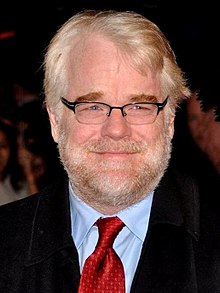
Back Philip Seymour Hoffman Afrikaans Philip Seymour Hoffman AN فيليب سيمور هوفمان Arabic فيليب سيمور هوفمان ARZ Philip Seymour Hoffman AST Filip Seymur Hoffman Azerbaijani فیلیپ سیمور هافمن AZB Філіп Сеймур Хофман Byelorussian Филип Сиймур Хофман Bulgarian ফিলিপ সিমোর হফম্যান Bengali/Bangla
Philip Seymour Hoffman | |
|---|---|
 Hoffman in 2011 | |
| Born | Philip Hoffman July 23, 1967 Fairport, New York, U.S. |
| Died | February 2, 2014 (aged 46) New York City, U.S. |
| Alma mater | New York University (BFA) |
| Occupations |
|
| Years active | 1991–2014 |
| Works | Full list |
| Partner | Mimi O'Donnell (1999–2014) |
| Children | 3, including Cooper |
| Relatives | Gordy Hoffman (brother) |
| Awards | Full list |
Philip Seymour Hoffman (July 23, 1967 – February 2, 2014) was an American actor. Known for his distinctive supporting and character roles—eccentrics, underdogs, and misfits—he acted in many films and theatrical productions, including leading roles, from the early 1990s until his death in 2014. He was voted the greatest actor of the 21st century in a 2024 ranking by The Independent.[1]
Hoffman studied acting at New York University's Tisch School of the Arts. He gained recognition for his supporting work, notably in Scent of a Woman (1992), Boogie Nights (1997), Happiness (1998), The Big Lebowski (1998), Magnolia (1999), The Talented Mr. Ripley (1999), and Almost Famous (2000). He began to occasionally play leading roles, and for his portrayal of the author Truman Capote in Capote (2005), won the Academy Award for Best Actor. Further Oscar nominations came for playing a brutally frank CIA officer in Charlie Wilson's War (2007), a priest accused of child sexual abuse in Doubt (2008), and the charismatic leader of a Scientology-type movement in The Master (2012).
While he mainly worked in independent films, including The Savages (2007) and Synecdoche, New York (2008), Hoffman also appeared in Hollywood blockbusters, such as Twister (1996) and Mission: Impossible III (2006). He played Plutarch Heavensbee in the Hunger Games series (2013–2015), in one of his final roles. The feature Jack Goes Boating (2010) marked his debut as a filmmaker. Hoffman was also an accomplished theater actor and director. He joined the off-Broadway LAByrinth Theater Company in 1995, where he directed, produced, and appeared in numerous stage productions. Hoffman received Tony Award nominations for his performances in the Broadway revivals of Sam Shepard's True West (2000), Eugene O'Neill's Long Day's Journey into Night (2003), and Arthur Miller's Death of a Salesman (2012).
Hoffman struggled with drug addiction as a young adult and relapsed in 2012 after many years of sobriety. In February 2014, he died of combined drug intoxication. Remembered for bringing nuance, depth, and humanity to the versatile roles he inhabited, Hoffman was described in his obituary in The New York Times as "perhaps the most ambitious and widely admired American actor of his generation".[2]
- ^ "The 60 best actors of 21st-century cinema, ranked". The Independent. December 28, 2024. Retrieved December 31, 2024.
- ^ Weber, Bruce; Goodman, J. David (February 2, 2014). "Philip Seymour Hoffman, Actor of Depth, Dies at 46". The New York Times. Archived from the original on July 8, 2014. Retrieved February 2, 2014.